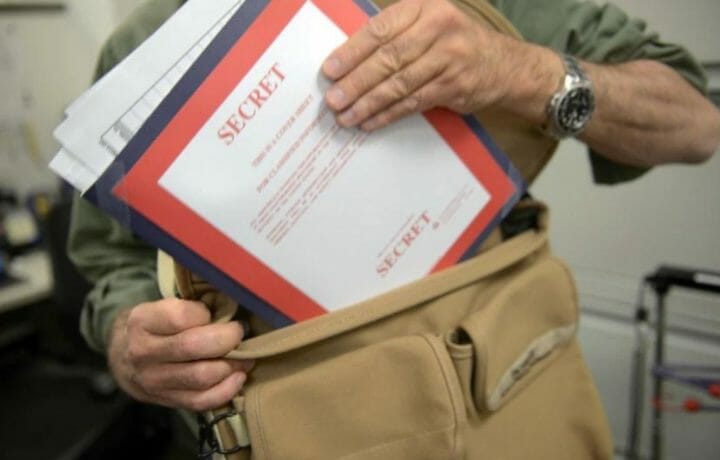The rules for handling and storage of classified information have gotten a lot of attention this year courtesy of politicos in both parties, as well as, a certain Guardsman. The take-away – don’t bring classified information home – should be obvious to all of us, as it hopefully was already.
Despite the rules, however, clearance holders are human, and humans make mistakes. Classified material inadvertently walks out the door far more often than the government wants. In the panic that follows its discovery at home or in the car, clearance holders don’t always know what to do about it.
bring the classified material back to work
The answer to this question – bring the material back to work – may seem just as obvious as the prohibition on removing it, but there are a couple of important caveats. The first of these is that tomorrow morning is too late. The natural instinct of some people is to wait until the following morning to surreptitiously return the material on their normal trip into the office and hope no one is the wiser. That may sound like a good idea in theory, but there is one big problem with it: you may not pull off the feat undetected.
In the intervening hours, it is possible that the missing material may be noticed and an investigation commenced. It is also possible that your belongings may be selected for search upon entry to your worksite and the materials discovered. Either scenario would be catastrophic for your perceived integrity; and for clearance holders, integrity is perhaps the number one required character trait in the eyes of the government.
The reality is that the only time to return the classified material to work is immediately – as in the moment you discover it, even if that means canceling evening plans or battling rush hour traffic again. But this brings me to the second caveat, which is what to do before you start that return journey.
Don’t Miss This Step
Yes, I realize that I just said that the only time to return the classified material to work is immediately, but there is, in fact, one quick step you should take to protect yourself first: contacting your supervisor and/or agency security officials to let them know what happened and that you’re on your way back to the office. The reason this is so important is not just that your belongings may be searched upon re-entry or that the material may have been noticed missing, but also that you cannot predict what may happen along the way.
Imagine that you get stopped by police while en route and subjected to a vehicle search. Will your explanation of “I was returning it to work” be deemed credible absent a classified information courier card? Or, will the FBI be called for a suspected espionage case? Alternatively, what happens if you get mugged or carjacked and the material is stolen? How will you explain that if an internal investigation subsequently fingers you for the missing material?
Mitigate Risks
I realize these may sound like far-fetched hypotheticals, but crazier things have happened. In my industry, a top priority is mitigating risk – especially the avoidable kind. True, your prompt notification and return of the material may still subject you to a range of adverse actions depending on the situation, the agency, and whether there is a past history of similar mistakes; but I’d rather take my chances with that than with some unexpected bad luck.
This article is intended as general information only and should not be construed as legal advice. Although the information is believed to be accurate as of the publication date, no guarantee or warranty is offered or implied. Laws and government policies are subject to change, and the information provided herein may not provide a complete or current analysis of the topic or other pertinent considerations. Consult an attorney regarding your specific situation.




